The views expressed in our content reflect individual perspectives and do not represent the authoritative views of the Baha'i Faith.
How can any artist do justice to one of the world’s greatest mystical books? In this interview with Paloma Piano, we explore that question.
Paloma Marin is better known by her musician name Paloma Piano. Born and raised in Bogota, Colombia, she first discovered the Baha’i Faith as a child, but it wasn’t until the age of 22 that she began to regard herself a Baha’i.
Paloma is a multidisciplinary artist, having studied music composition and production at EMMAT, and jewelry design at Artesanías de Colombia, she is also a painter and a poet.
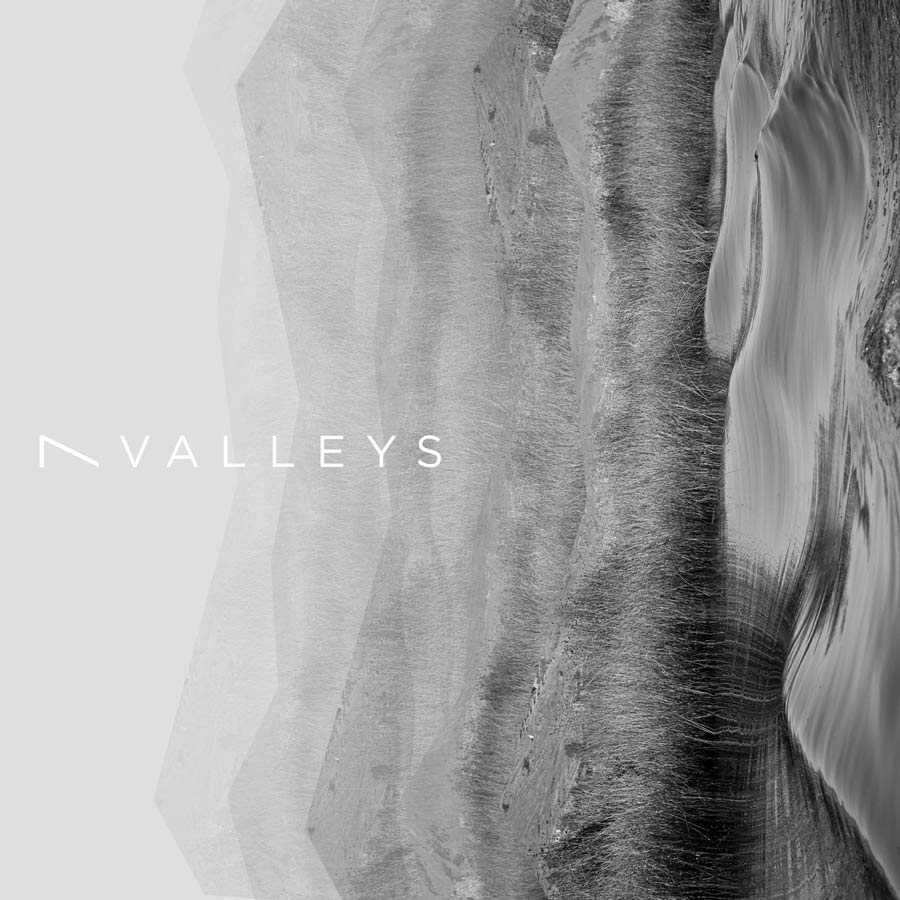 I first came across her album, 7 Valleys, a few months ago, and found that her musical journey through Baha’u’llah’s mystical book The Seven Valleys resonated with me deeply on a spiritual level. The Seven Valleys is a book written by Baha’u’llah in the structure of a lyrical poem, and it follows the path of the human soul on its spiritual journey. The soul passes through different stages, realms and emotions—through seven “valleys”—on a path that leads closer to God.
I first came across her album, 7 Valleys, a few months ago, and found that her musical journey through Baha’u’llah’s mystical book The Seven Valleys resonated with me deeply on a spiritual level. The Seven Valleys is a book written by Baha’u’llah in the structure of a lyrical poem, and it follows the path of the human soul on its spiritual journey. The soul passes through different stages, realms and emotions—through seven “valleys”—on a path that leads closer to God.
Listen to Paloma Piano’s album 7 Valleys while you read the interview:
Listening intently to her musical interpretation of The Seven Valleys, I was eager to learn about the creative and spiritual journey that lead Paloma to compose and produce her album.
In the first part of this three part interview, we learn about Paloma’s creative and spiritual journey that lead her to recording her first album 7 Valleys, what aspects of the Baha’i Faith most inspire her as an artist, how she believes art can contribute to social transformation, and the exciting release of her sophomore music project, EÓN.
Q: When were you first introduced to art? Who are your main inspirations in life?
A: Both of my parents inspire me. Since I was a little child my father used to read me stories out loud. He would read me stories by Oscar Wilde, Isaac Asimov, Edgar Allan Poe. He also read me poems by Pablo Neruda, León de Greiff, Porfirio Barba Jacob, Rafael Pombo, Federico García Lorca among many others. I believe that all this helped inspire and expand my imagination. My mother, on the other hand, encouraged me to paint and do crafts. At the house we lived in I used to create all sorts of things. My mom helped me in all my projects, as she is very good at designing and building things. It’s hard to recall all the classes she put me in—I recall being placed in classes for clay, porcelain, painting, theatre, piano, guitar, flute and so many others.
I spent my childhood and teen years growing up in Bogotá, Colombia. One of the things I also loved about my childhood was that every Sunday my family and I would walk together to a mountain called La Balbanera in a town called Chia. My father used to play this game with us where we had to be silent and focus on listening to the surroundings, and then share our experience with each other. He showed me how to be present and to appreciate the beauty of nature, the trees, the mountains, the sky, the wind. He talked about the importance of nature, of questioning our place in the infinite universe and having good quality conversations. I am lucky to have such wonderful parents.
Q: Could you share a bit about your creative journey and what inspired you to become a multidisciplinary artist?
A: Becoming an artist is something I didn’t really choose—it just happened. My parents always gave me the freedom to make my own decisions and follow my dreams. They’ve always supported me in my creative projects. I believe that following the path of an artist is a way of life that just translates to different mediums, languages and ways of connecting to life. Once I understood this I realized that at the end of the day all I was doing was connecting to the world through different levels or dimensions. For instance, music is one of these dimensions that can also be translated to an image, or another type of code.
As artists we are immersed in mediums that are constantly moving and changing, the sounds we emit are frequencies that can also be translated into different colors, languages, and shapes. The same with music and numbers, or the lines in our skin or a leaf or stone. They all talk about different realities, information, that diverges in this space and conditions the shape the universe. This quotation by Abdu’l-Baha expands on the idea that we are in a place of infinite possibilities with the power to create, we are all artists navigating different perspectives:
… the forms and organisms of phenomenal being and existence in each of the kingdoms of the universe are myriad and numberless. – Abdu’l-Baha, The Promulgation of Universal Peace, p. 285.
Q: You’re a painter, poet, jewelry designer, and musician. How do all these mediums and your music inform each other?
A: On a personal level each art form talks about different realities within my own being and what I’m experiencing. For example, my relationship with painting and jewelry is very optimistic—through these mediums I’m inspired to show what I see as beautiful in nature, color, energy, the concepts of freedom and spirituality. I can also express the darker places of my consciousness, and portray them as something fascinating.
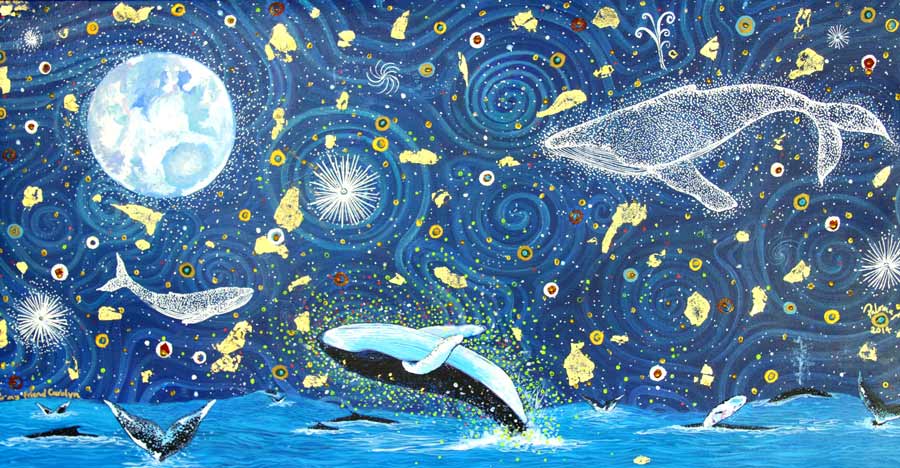
One of Paloma Marin’s paintings.
With music I tend to be more melancholic and existential. This is where my more heavy-hearted notes appear. However sometimes, at very special moments when playing music I feel a different emotion comes into the equation—that emotion where you feel completely peaceful and still, a state of oneness with everything that I find hard to put into words. It’s one that I feel most intensely when immersed in nature, when meditating or praying. These moments are where the best melodies and harmonies appear. It also comes to me sometimes when painting and making jewelry. Abdu’l-Baha speaks about the role of meditation in helping us connect to the spiritual world to uncover divine mysteries and translate them into the visible through arts and sciences:
Meditation is the key for opening the doors of mysteries. In that state man abstracts himself; in that state man withdraws himself from all outside objects; in that subjective mood he is immersed in the ocean of spiritual life and can unfold the secrets of things-in-themselves. To illustrate this, think of man as endowed with two kinds of sight; when the power of insight is being used the outward power of vision does not see.
This faculty of meditation frees man from the animal nature, discerns the reality of things, puts man in touch with God. This faculty brings forth from the invisible plane the sciences and arts. Through the meditative faculty inventions are made possible, colossal undertakings are carried out; through it governments can run smoothly. Through this faculty man enters into the very kingdom of God. – Abdu’l-Baha, Paris Talks, p. 175.
Q: How do the teachings of the Baha’i Faith inform your work as an artist? Are there any specific passages from the Baha’i writings that have influenced your work? Could you share some examples?
A: Nowadays all of my projects have a direct or indirect relationship to the Baha’i writings. I always discover a new meaning in the Baha’i teachings, or new passages that surprise me and present new, universal perspectives—and with time they become more clear and logical. One of my favorite books written by Baha’u’llah is The Seven Valleys, which talks about the journey of the soul. This book inspired my first album, which I called 7 Valleys. The process of creating it involved identifying songs I already composed in my childhood and adult life which connected with that of the wayfarer’s journey through The Seven Valleys:
The stages that mark the wayfarer’s journey from the abode of dust to the heavenly homeland are said to be seven. Some have called these Seven Valleys, and others, Seven Cities. And they say that until the wayfarer taketh leave of self, and traverseth these stages, he shall never reach to the ocean of nearness and union, nor drink of the peerless wine. – Baha’u’llah, The Seven Valleys, p. 5.
Listen to more of Paloma’s music on SoundCloud.


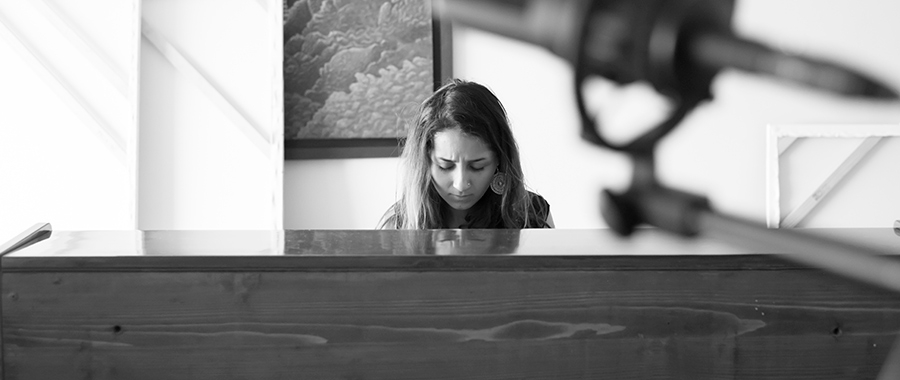

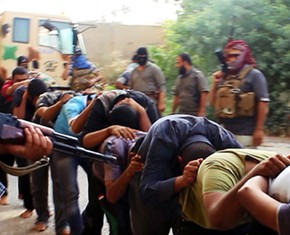
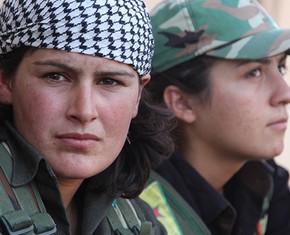
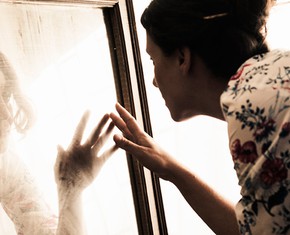









Comments
Sign in or create an account
Continue with Googleor